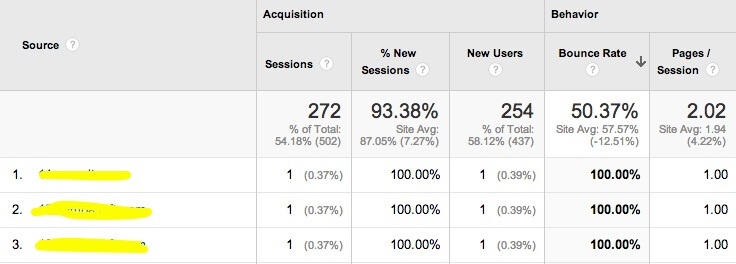How To Put The Brakes On Overzealous Link Junkies
If links are good, does that mean more links are better? Not always. Sometimes you need to push back.

As search marketers, we often find ourselves being pressured (and begged and threatened and cajoled) to build more links and build them right now.
So when a friend in the industry asked me to give him some information on what a typical “safe” monthly link goal was, as his superiors weren’t happy with the quantity of links being produced, it really made me think about how sometimes, we need to push back.
The problem is it’s difficult to actually do this without appearing as though we are merely trying to justify doing less work — especially since those outside of the search marketing world are often not well educated on the risks involved in building links.
For example, we once did a one-month trial for a client in which we built a few more links than I was comfortable with. We wanted to show that client what links could do, and he was so happy with the results that he became a bit of a link junkie. Throughout the rest of our working relationship, it was necessary to continually explain to him that link building isn’t a matter of “the more, the better.”
Would more inbound links mean more traffic or better rankings? Probably. Would it mean more risk? Probably.
Below are some tips on how to slow things down if you’re being pressured by clients or management to crank out a ton of links each month.
Think About The Actual Risks Involved
Google seems to always be adding something new to their Webmaster Guidelines. So, whatever you’re doing in large quantities now can easily translate into something you’ll have to fix in large quantities in the future. If you’re doing a lot of it, chances are so is everyone else — and chances are it will get factored into a new update that will crush the tactic.
A site penalty may or may not crush a site. Sometimes, it can be reversed easily — other times, it can take months of hard work to recover from a penalty. So if you have a link building tactic you like to use in bulk, and you can afford to be deindexed or just not found anywhere in Google for a while, then go for it. If not, don’t go so link crazy.
Look At What Your Competitors Are Doing
To be clear, I don’t mean that you should go and find the biggest brand site on earth that sells what you sell and then conclude that if they generate 1000 links a month, then so can you. I mean find your actual competitors (not just your ideal ones) and see what they’re doing. If they’re all still using exact match anchor text and it’s working, that doesn’t give you a free pass to do the same thing.
You don’t want to do this exercise in order to push the boundaries necessarily, but it can be very useful to figure out how to avoid getting caught for something that everyone else is doing. Use what they’re doing to figure out how to do something different. Use it to figure out how to do something safer. These days, you can’t put a price on staying safe with your online marketing.

Image taken from a Link Research Tools report.
Remember, Your Site Is Its Own Entity
So many businesses think that if Competitor A does 15 links a month, Competitor B does 16, and Competitor C does 14, then that means that they need to do 17 a month. It just doesn’t work that way.
You might build 15 links per month and still rank below everyone else because their sites are just better in other ways. You might rank above them and still sell less because they’re more well known or have awesome social setups.
There is no magic number of links that guarantees anything.
Look At The Actual Referral Traffic From Your Links
Are you even getting any traffic from your link building efforts? Plenty of links are great for rankings but not so great for traffic. Plenty of links can bring you traffic that doesn’t convert, ever. What if Google starts looking at that?
A link that brings traffic and helps you rank is not an easy link to get — so don’t expect to be magically attracting these in great numbers each month. You may have 2 links that send you good traffic and thousands that don’t. Wouldn’t you rather have 2 more that send you traffic than 1000 more than don’t?
Look at the referrals that bounce right off your page, too. Why is that happening? Instead of constantly pursuing more links, maybe you can figure out why people leave immediately after clicking on one of your existing links.
Keep A Very Close Eye On Your Links
You should do this anyway, of course; but, if you’ve been told that you need to get 25 links this month, period, then you really need to look at what else is being done.
For example, is everyone on your link team getting 25 links a month, meaning that a site that used to generate 10 links a month is now getting 100? That looks odd for an unranked, relatively new site.
Among first things I examine in a link audit are link spikes, since these are often an indicator of unnatural link building practices. Sometimes, link spikes are totally natural — but sometimes, they can indicate a problem that everyone on your team is unaware of because of a hack, negative SEO, etc.
Vary Your Link Types
If you’ve just been successful at getting some good links on resource pages, create your own resources and use social media in order to push them so that you generate links to them. You’re still talking resources, but it’s not exactly the same thing.
If you are submitting the site to directories, see if you can get your site mentioned in a local news outlet. If you have 95% followed text links, do some nofollows. Don’t think that just because you’ve gotten results from doing one thing, you need to do it to death.
Ask What Else Is Being Done
Ask — because much of the time, no one’s going to tell you. Who else is building links? What tactics are they using? If you get pushback, point out that the more you know, the more efficiently and safely you can do your own work. It’s pointless to do a good job when you’re being sabotaged by someone else who’s just bought 100 networked links or commented on 500 blog posts.
Don’t just get link-happy and think that because you’ve gotten a few good ones, you need to get more, more, more. If you’re in doubt about whether a link could hurt you later on, have it nofollowed; or, if it doesn’t look like it will be good for traffic, just don’t pursue it.
The belief that more links means more awesomeness all around is way too simplistic — not to mention dangerous. If you’re being pressured to do more, arm yourself with some information and educate your boss or your client or your team lead. Being a good link builder today also means being a responsible link builder.
Contributing authors are invited to create content for Search Engine Land and are chosen for their expertise and contribution to the search community. Our contributors work under the oversight of the editorial staff and contributions are checked for quality and relevance to our readers. The opinions they express are their own.
Related stories
New on Search Engine Land
